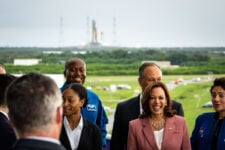Vice President Kamala Harris and Second Gentleman Doug Emhoff meet with astronauts at the Operations and Support Building II, in view of the Artemis Rocket on a launch pad at the Kennedy Space Center on Monday, Aug. 29, 2022 in Cape Canaveral, FL. (Kent Nishimura / Los Angeles Times via Getty Images)
WASHINGTON — It might be about time the US government created a cabinet-level organization to manage the nation’s equities in outer space — streamlining bureaucratic red tape and better integrating civil, military and commercial regulatory activities, according to the latest version of the space industrial base workshop report spearheaded in part by the Pentagon’s Defense Innovation Unit (DIU).
“It may be time for the U.S. to centralize the authorities to regulate, advocate and orchestrate national interests in space under a single department or Agency with a cabinet level secretary — but only when the conditions are most appropriate for its assured success,” states the report, State of the Space Industrial Base 2023, released today.
The report is the fifth in a series spearheaded in part by the DIU, the Pentagon’s innovation arm, stemming from an annual set of workshops with industry representatives and government officials, including from DoD and the Intelligence Community. The aim of the report is to advocate for measures to strengthen the US space industrial base as a means of national economic power in large part to prevent China from becoming the world’s leading space player on the global market.
While the authors are active Defense Department officials, the report makes it clear it is not an official document, nor do the views expressed in the report represent official DoD or US government policy.
If a new department or, alternatively, a “Department of Space,” was established, the report recommends that it be modeled on the Department of Energy (DoE), “wherein the Executive retains the ability to act decisively, control costs, accelerate strategic programs, and achieve impact where most immediate.” This is in contrast, the report stresses, to the Department of Homeland Security that “continues to operate under the full weight of the bureaucracy and despite numerous deficiencies (i.e. integration with the intelligence community) that are well documented.”
In the meantime, the report says, there should be “a concerted effort to streamline the bureaucracy under the Vice President, or an appointed Director of Space” to assure “the preservation of the space industrial base, continued growth of the workforce and the economic benefit it will unleash in the decades to come.”
The report’s four key findings this year, according to a DIU spokesperson, emphasize efforts to:
Establish trusted and resilient supply chains both domestically and with our allies;
Streamline bureaucratic processes to accelerate activities that delay licensing;
Improve access to financial tools necessary to normalize space as a contributor to the economy; and
Broadly adopt ‘allied-by-design’ to improve interoperability and scaling with global partners.
“Major themes” emerging from the workshops held to build the report include the need for continued “non-dilutive” investments by the DoD, NASA, Department of Commerce, and other government agencies. “Actions that accelerate the transition from prototype transactions to ‘meaningful contracts’ for procurement of hardware, software or services is key to sustaining the interest of private investors who have made billions of dollars of early-stage investments into technologies of significant interest to our national security,” the report asserts.
One of the major problems requiring urgent resolution pointed to by workshop participants, the report says, are the obstacles to that necessary US government investment created by the long-standing practice by Congress of punting federal funding bills in favor of rolling continuing resolutions.
By contrast, a “major opportunity” for progress emerging in 2023 is the “accelerated advancement of high cadence, reusable, heavy lift launch capability” that “is paramount to achieving a sustainable path to economic prosperity and collective security.” This year “may prove to be the pivotal year in setting the conditions for either expanded U.S. market leadership or retreat in this very competitive global sector — and critical area to both the future space economy and national security.”
The report adds that there also are opportunities “provided by the new trilateral security partnership agreement between Australia, the United Kingdom and the United States (AUKUS) and 4 similar bilateral agreements with other partners must be acted upon to establish the beginning of a global network of spaceports that assure space launch resiliency and broader access to the new space economy.”











